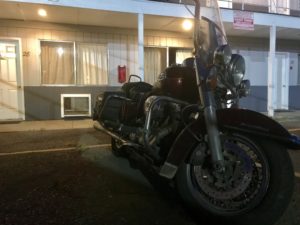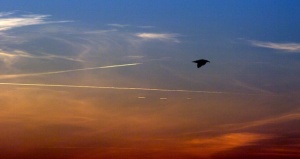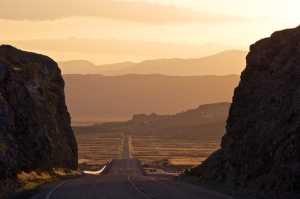Thunder rolls up from beyond the bay, across the bar.
Blown in suddenly from the south-west, out of the sea and over the Cape. I turn from a vivid western sky laying its sun to rest, to watch this new cooling rain washes away the tracks of today‘s ride, and it somehow satisfies me to rest now, to step aside and watch from the protection of my overhead cover, while the wild forces have their raucous celebration. It gives me a chance to look back in my mind’s eye to the those tracks, to commit them to memory, quick, before they are washed away.
They started a long way back. Â Hours ago, but it seems like weeks…
The first tracks of the day were laid in a cloud of red dust, dirt tracks in the volcanic rock of Central Oregon. The dirt road leads reluctantly out of the wood, winding its way across a meandering river toward the only highway it knows. By the time I reach the long thin ribbon of asphalt ten miles off that drains away to the south, the heat of the day and the engine was already wearing on me. Â I twisted the throttle like a drowning man in need of rescue.
Highway speed: that speed that pushes enough hot air over and through and around you that you begin to feel a little relief from the heat. Today’s highway speed was fast. Danged fast. A mad dash straight into the enemy, jaw set. Fate be cast aside.
For an hour I charged. For an hour the desert highway threw what it had to throw at me. For an hour, grim-faced with my mind set on conquering, I pushed through the heat. When finally I reached my junction, the air above the pavement rippled a nod, a tacit acknowledgement that this wasn’t over, we would meet again. There is no winning. Only surviving. I turned west, and throttled up, away into the mountains.
At 5000ft, it still took the sudden jolt of raindrops on my bare arms to unset my jaw, and relax my grip on the throttle. Just a few drops from a wayward thunderhead, but enough to disengage from the battle. My pace slowed, and I took in a whole new scene, the alpine forest of the Cascades. Green was everywhere, on either side, above me, even up against the road‘s edge. The bike splashed through the dappled shadows on the road like a spring foal. It held tight and steady through the mountain twists and turns, and dove over the summit eager for the ride down the other side. The sense of freedom ducked around every turn and rise like a will-o-the-wisp. Always there, never there, leading away to where my spirit was meant to go.
On the other side of the mountains, waiting like a Hatfield cousin, was another kind of heat. I entered this 7th level of hell knowing it would be there, ready to endure again. I opened myself to this heat, let it flow into me, and basked. knowing this was the only way through it. I left the main highway for smaller back roads to work my way over to Grants Pass. It was beautiful farm country, mostly hay and horses, but hotter by far than the desert air. The occasional river provided short spells of relief, with shaded groves and waysides, but I knew that to truly escape I had to get over one more range of mountains, and find the comfort of the sea. So I pressed on.
With Grants Pass and the Rogue Valley behind me, the temperature finally began to drop. Passing Cave Junction, and later smaller sister town of O’Brien, felt a little bit like leaving civilization for good. the houses thinned out and disappeared and the road finally hopped over the summit to begin the twisting descent to the sea by way of the Smith River.
The western side of these mountains are steep, rugged, and inhospitable to the Lazy. The River starts as a stream deep in a ravine, and the road narrows and hugs the north side of the canyon. The rocky slope comes in close against the west-bound lane, its grass and blooming plants only an arms-length away as the bike weaved its way down the winding descent. This narrow road feels intimate, and gives me a sense of belonging to this place. But the reality of belonging comes with a price. Respect must be paid to the deep gouges in the asphalt, especially on the inside turns. The realization that these deep pits are the marks of giant boulders that have fallen from above, and that there are plenty more waiting for their time up above me, weighs darkly enough to remind me not to stop here, not get too acquainted with its charms.
Instead, I find a rhythm in the sweeps and turns. The rock gouges form the percussion section of a powerful symphony of movement and space, lines drawn across each other, highway and this canyon.
The River itself is not a kind place. The water tumbles and falls through cuts in the exposed rock bed of the earth 100 ft below the highway. Â This is no place for asking forgiveness. This is a stern river, not interested in accommodating the frail human body. I pass a creek named “Hardscrabble Creek”, and with one glance I believe in its name. I can picture the old prospector, using language as hard as the land, on a mule equally toughened, asking no permanent place nor easy life here.
The canyon widens, and begins to serve as a gathering place for other ravines, and other creeks. From the left and right, I can see the land ahead and below me like folded fingers, interlocked ridges drop in from the high mountain lines on either side of the River. The sense of the eventual sea begins to impose itself on the western horizon, shaping the light through an indolent afternoon haze.
Only just below me now, I catch the scent of a familiar place, a place where Monarchs reign. The highway draws away from the River, drops altitude, and instead of riding on top, looking down on the path ahead, I find myself in it, escorted on either side by high, close walls. I have entered the realm of the giant redwoods.
These trees have lived here for longer than any kingdom of mankind, sustained by this unique combination of soil and fog. They live only here, in this one inconspicuous, out-of-the-way corner of the world. I ride into the gathering darkness, and as my eyes adjust I see the Giants all around me, standing watch, guarding an ecosystem as complex and old as any on earth. The trees themselves are gigantic.
I suddenly feel very, very small.
And quiet.  The idea of “quiet†has been far from my mind for hours, but now it knocks, insistently, on my sub conscience
I relax my grip on the throttle, trying to use as little as possible. The whole grove that I’m riding through seems enormously quiet. But as the bike winds its way through the giants, it seems that it‘s not the volume, but the pace of life in this insulated world that makes the difference. The stillness calls out, I can sense the dissonance between the life in this woods and my own furious westward charge. Slowly my mind finds itself wanting to rest here amongst the trees. There is a knowledge here that can only be expressed in a sense of time. The urge to stop is nearly irresistible. The call to park, and walk away from the bike, and just stand and hear Life being lived, to change my pace to match this place pulls hard at me. I dare not stop though. Something inside tells me how the scene would play out.
I can imagine myself stepping through the the forest floor, climbing over a log, and looking back to realize the road has completely disappeared. Reaching an open spot amidst the trees and looking up into the coliseum of Life. There is no clamour, only patience. Conscious patience waiting on me to reach for it.
And me, stretching my arms like a child, an expression of hope, knowing I cannot reach that patience today, but in time.
And planting my feet, like thus.
And then, maybe, that would be the last anyone would hear of me. Unless they too quietly strode into a forest to wait.
And maybe this old human body would change to a young sapling of the same age. And in a thousand years. if such things still mattered, I might begin to think I understood what it means to be.
At Peace.
But today, in spite of my instinct, I ride on.
Perhaps it is because I’m not ready for Peace.
Perhaps my soul has more to gather before it rests.
Perhaps it is because I’m destined only to be a minstrel, not a King.
But that peace now follows me, hovering like a stationary mirage, calling out once in a while, just to remind me of its voice.
And it leaves deep tracks that are not so easily washed away in a summer thundershower over the bay.
Like this:
Like Loading...

 Filed Under :
Filed Under :  Sep.28,2021
Sep.28,2021





 Tags :
Tags :